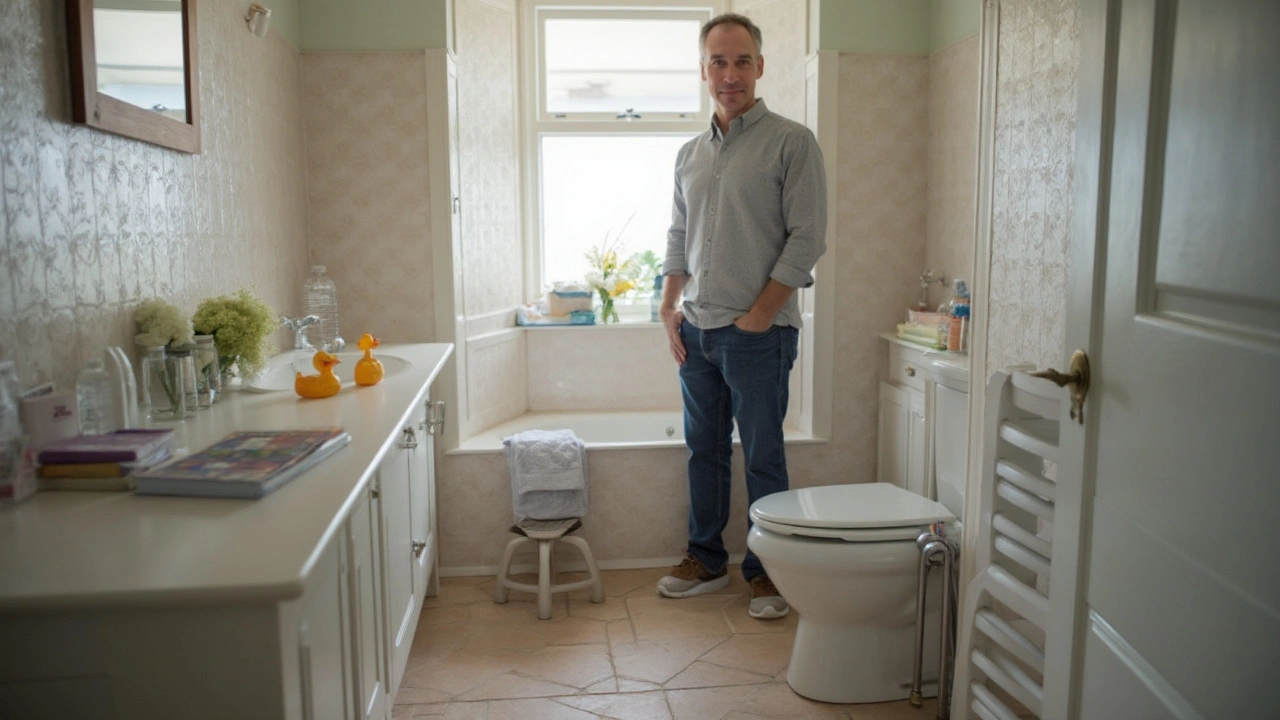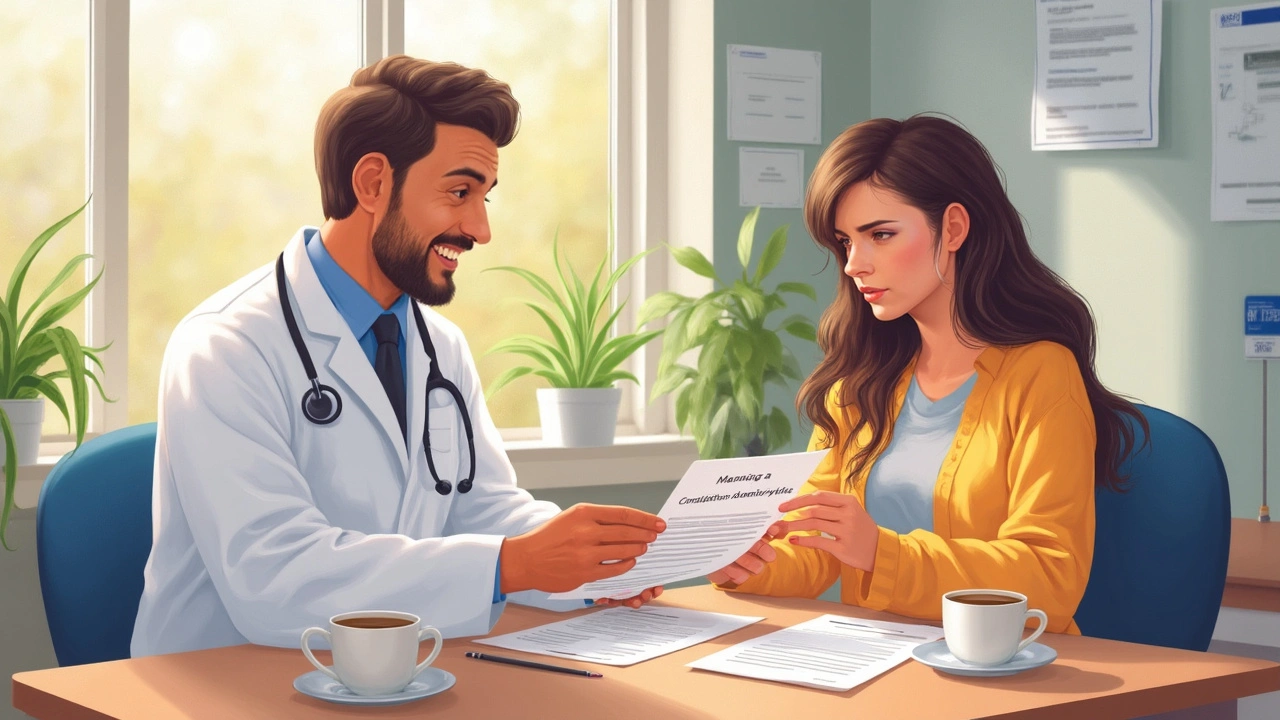Started amitriptyline and now your bathroom routine is acting up? You're not alone. Constipation is actually one of the most common side effects of this medicine. It can slow your guts down, leaving you with all sorts of annoying symptoms—from feeling bloated to straight-up getting stuck.
But don't panic. There are practical ways to handle this, and you definitely don’t need to suffer in silence. Changing what you eat, how much you drink, and even how you move can make a real difference. Doctors see this problem all the time, so you’re not the odd one out.
The good news? Most people find a routine that works for them. So let’s break down why amitriptyline messes with your gut and what you can do—starting today—to get things moving again.
- Why Amitriptyline Causes Constipation
- Spotting the Signs: How Constipation Shows Up
- Practical Fixes: Food, Fluids, and Movement
- Bathroom Hacks That Actually Work
- Knowing When to Speak Up (and What to Ask Your Doctor)
Why Amitriptyline Causes Constipation
If you’re taking amitriptyline and you suddenly start spending way less time in the bathroom, there’s actually a pretty straightforward reason. Amitriptyline is a type of medicine called a "tricyclic antidepressant." While it helps with mood, sleep, and pain, it also slows down signals in your nervous system—especially the ones telling your gut to move food along.
Basically, this medicine blocks a chemical called acetylcholine. It’s a chemical messenger that tells the muscles in your intestines to squeeze and push stuff forward. No acetylcholine, no smooth moves—literally. That’s what leads to constipation.
As much as 30-40% of people on amitriptyline end up with constipation, especially at higher doses or when first starting it. That’s not rare at all. Here’s what’s actually happening in your gut:
- Your colon moves slower than usual, so stool sits around longer and gets drier.
- Your muscles are less likely to contract and push things along.
- Your body may absorb more water from stool, making it even harder and harder to pass.
If you were already having issues with bowel management or gut health, amitriptyline can make things way worse. Plus, it doesn’t help that side effects like dry mouth (another common one) make you want to drink water less—even though you actually need more fluid to help things move.
Spotting the Signs: How Constipation Shows Up
When you're on amitriptyline, constipation isn't just about not going as often. Sometimes, the signs are sneakier or a lot more frustrating than most people expect. One red flag is if you’re pooping less than three times a week. But there’s more to it than just the numbers.
You might notice your stool is hard, dry, or comes out in small lumps, kind of like rabbit droppings. That’s a classic clue things are slowing down. If you feel like you have to strain or sit there forever, that’s also a big sign. And don’t ignore that uncomfortable feeling like you didn’t finish, even after you’ve gone.
- Bloating or a full feeling in your belly
- Cramps or mild stomach pain
- Needing extra effort or more time on the toilet
- Even needing to use your fingers to help things along (yep, some people do that—it’s more common than you think)
If you skip days, start dreading bathroom trips, or suddenly feel more gassy or crampy than usual after starting amitriptyline, don't just write it off. These are all hints your gut is moving slower thanks to the med.
| Symptom | How Common? |
|---|---|
| Less than 3 bowel movements per week | Very common |
| Straining while pooping | Common |
| Hard, dry, or lumpy stools | Common |
| Bloating or stomach discomfort | Fairly common |
Some folks are caught off guard when they start amitriptyline and things just slow way down. So if your body's routines suddenly get off-track, don’t ignore it. These early signs give you a head start in managing the side effect before it gets worse.

Practical Fixes: Food, Fluids, and Movement
If you’re stuck with constipation from amitriptyline, what you eat and drink makes a big difference. The gut absolutely loves fiber, but most people get way less than what’s needed. If you’re not sure how much fiber you should get, the magic number for adults is around 25 to 30 grams a day. An easy way to up your fiber is to swap white bread for whole grain bread, grab fruit instead of chips, and load up on veggies. Even a handful of nuts helps.
But here’s the thing—fiber needs water to work. Without plenty of fluids, all that healthy food can actually make constipation worse. Aim for at least 6–8 glasses of water daily. If you’re always on the go, carry a water bottle so you remember to sip throughout the day. Coffee and tea can help too, but try not to rely just on caffeine for bathroom success.
Movement isn’t just about burning calories—it helps your gut get going. Walking, stretching, or even a quick dance break after lunch can help wake up your intestines. You don’t need to start a hardcore gym routine. Just fifteen to thirty minutes a day of any activity you like can boost bowel action.
- Eat more fiber: whole grains, beans, apples, pears, carrots
- Drink more fluids: water is best, but try herbal teas or clear soups too
- Get moving: walks, yoga, or even marching in place works
If you’ve tried all this and things still aren’t moving, don’t be shy about trying over-the-counter fiber supplements (think psyllium or methylcellulose). They can help, just make sure to drink lots of water with them.
| Food | Fiber per Serving |
|---|---|
| 1 medium apple (with skin) | 4g |
| 1/2 cup cooked lentils | 8g |
| 2 slices whole grain bread | 6g |
| 1 cup broccoli (cooked) | 5g |
When you start upping your fiber, go slow. Too much too fast can leave you gassy or bloated. Gradually work these habit changes into your daily routine and see how your body responds.
Bathroom Hacks That Actually Work
When you're on amitriptyline and constipation shows up, a few smart tricks can keep things from getting out of hand. Forget the random hacks you read online—these are tips doctors, nurses, and real people actually swear by.
First up, timing is everything. Try setting a bathroom schedule, even if you don’t think you need to go yet. Your gut actually responds to routine, and going at roughly the same time each day—especially after breakfast—can help kickstart your bowels.
- Foot stools (yep, really): Placing your feet on a small stool when you’re on the toilet puts your hips in a "squat" position. This actually straightens out your colon, making it way easier for things to move. There’s real science behind it, not just TikTok hype.
- Warm liquids: A cup of warm water, coffee, or tea first thing in the morning often gets the ball rolling. That morning caffeine can give your colon a nudge—roughly 30% of people get a noticeable effect from their coffee.
- Keep your phone in your pocket: Distractions like scrolling TikTok or reading emails on the toilet can actually make you spend more time than you should, which can backfire and make it harder to go in the long run. Focus on relaxing; it sounds minor, but it helps.
- The belly massage trick: Gently rub your belly in a clockwise circle (think: following your colon's path). Do this for a few minutes, and it can help stimulate movement inside. A lot of nurses recommend this with stubborn constipation.
If you’re still stuck, some people turn to over-the-counter options like stool softeners or fiber supplements, but check with your doctor before grabbing anything. And by the way, don’t ignore the urge when it hits—holding it in only makes things worse.
| Hack | How it Helps |
|---|---|
| Foot stool | Puts you in a squat position for easier passage |
| Warm drink | Starts natural contractions in the colon |
| Belly massage | Encourages movement along the digestive tract |
| Routine | Trains your bowel to expect action |
Try these hacks, mix and match, and you’ll figure out what works best for you. With a little trial and error, most people see real improvement in their bowel management on amitriptyline.

Knowing When to Speak Up (and What to Ask Your Doctor)
If your constipation on amitriptyline just won’t budge with home fixes, or it’s disrupting your life, it’s time to touch base with your doctor. Here’s when you really shouldn’t wait:
- You haven’t had a bowel movement for more than 3 days—even after trying fiber, water, and movement.
- You’re getting bad belly pain, swelling, or you’re feeling nauseous.
- You spot blood in the toilet or on the paper—never ignore this.
- You’re using over-the-counter laxatives more days than not.
- Other new health changes pop up, like weight loss or fever.
Despite the reputation, your doctor actually wants to hear about this stuff. They deal with amitriptyline side effects all the time, so it’s nothing to be embarrassed about. In fact, about 30% of people on this medicine get noticeable constipation. (See table below for quick stats.)
| Group | Reported Constipation |
|---|---|
| Amitriptyline Users | 30% |
| General Population | 10% |
When you do talk to your doctor, make it count. Be open about what you’ve tried and how bad it’s getting. Here are some good questions to ask:
- Could my dose be lowered to help with constipation?
- Is it okay to try a different medicine instead?
- Which over-the-counter remedies do you recommend—and how often?
- Might a prescription laxative help if this keeps happening?
- Could something else besides amitriptyline be making it worse?
Sometimes, constipation is just a side annoyance, but other times it points to something that needs attention now. Being honest keeps you safer and more comfortable—and that’s what your doctor wants, too.
